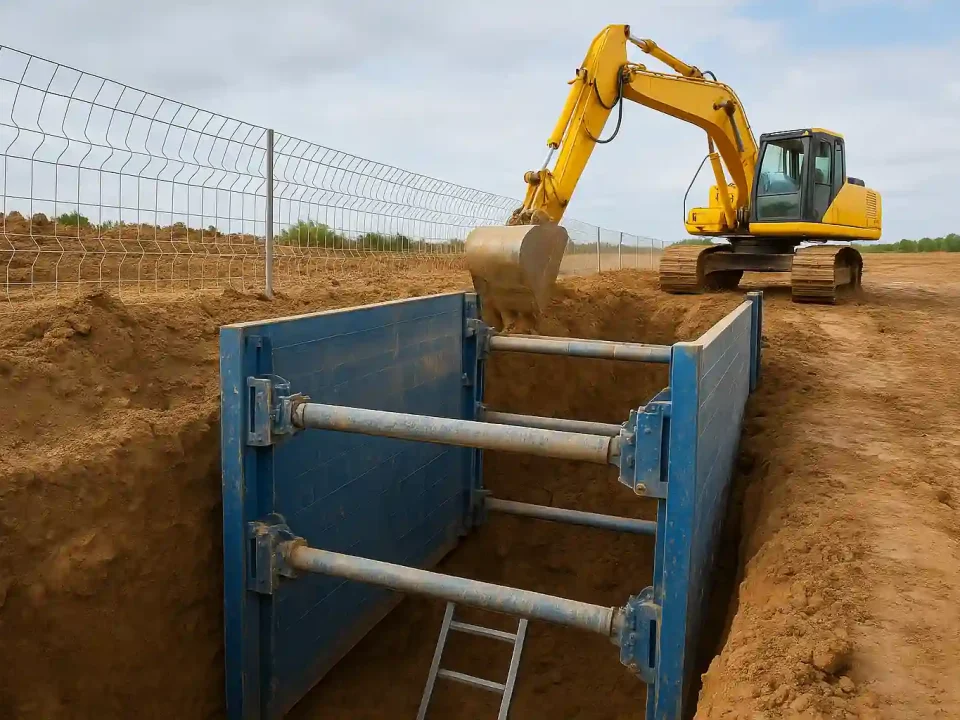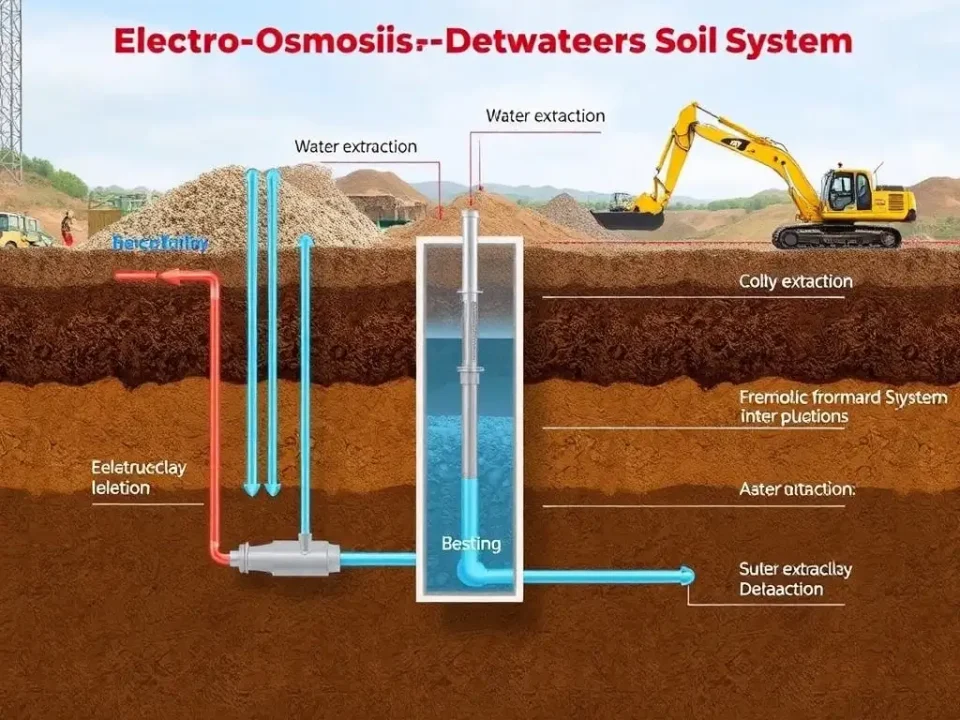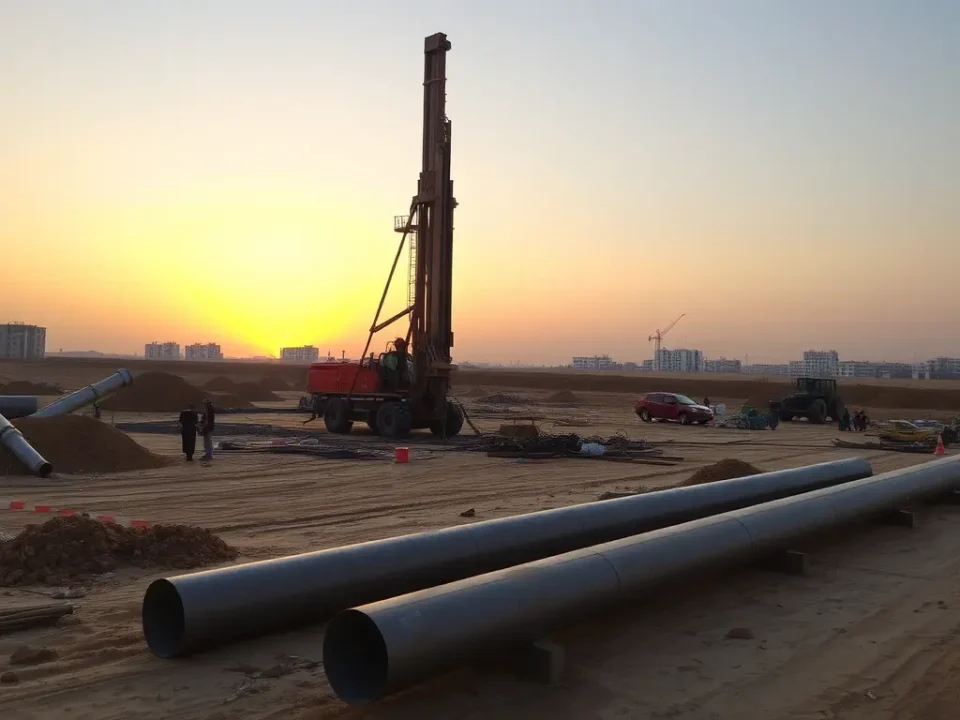
Dock Piling Installation by Aramenco in Kuwait
October 19, 2024
the Deep Well Point System:The Ultimate Dewatering Solution
December 26, 2024Your Comprehensive Guide to Soil Testing: Importance, Types, and Procedures
When we delve into the depths of the earth, we realize that the secret to the quality of the life we build lies within the silent soil beneath our feet. This seemingly simple element is the foundation of agriculture, construction, and even the surrounding natural beauty.
Soil testing is not just an analytical process; it’s a wise reading of the deep messages of the earth.
Through it, we understand soil properties and composition, determine its strength and bearing capacity, and even uncover its fertility and yield.Each grain of sand tells us how to plant, build, and design thriving, sustainable spaces.
What is Soil Testing?
Soil testing involves examining and analyzing soil samples to accurately understand their physical, chemical, and engineering characteristics.
It is an essential step before beginning any construction project to ensure the soil can support proposed foundations and structures.
Soil testing assesses soil strength, stability, groundwater levels, and type (whether clay, sandy, or rocky), ensuring the safety and stability of future projects.
Soil Testing Methods
There are several primary methods for soil testing, varying based on the required information about soil properties and analysis depth. Here are some key methods:
Boreholes
In this method, soil samples are collected from multiple depths using specialized drilling equipment, such as small excavators, and sent to specialized laboratories for detailed analysis.
This determines essential soil properties, such as:
- Density
- Moisture levels
- Grain composition
These tests provide precise data for understanding soil nature.
Field Testing
This soil testing is conducted directly at the project site to ensure accurate assessment under actual site conditions. Common field tests include:
- Field Density Test: Measures natural soil density.
- Standard Compaction Test: Estimates soil resistance to loads.
Laboratory Testing
Laboratory testing is carried out in a controlled environment and includes advanced tests such as direct shear tests and collapse tests.
These tests help determine soil strength and behavior under different stress conditions, allowing engineers to predict soil behavior under load.
Plate Load Test
This soil test evaluates the soil’s ability to bear heavy weights. The process involves placing known weights on the soil surface and monitoring the degree of settlement.
This provides a practical view of soil behavior under load and helps in designing safe foundations.
Types of Soil Tests
Soil tests can be broadly categorized into six types:
- Standard Penetration Test (SPT): Used to determine soil bearing capacity and basic characteristics
. This is a common test for evaluating soil strength. - Cone Penetration Test (CPT): Measures soil resistance to penetration, commonly used for examining sandy and clay soils to determine hardness and stability.
- Shear Test: Specifically evaluates soil shear resistance, especially for clay soils, aiding in assessing surface layer stability.
- Permeability Test: Measures soil permeability to water, crucial for determining water drainage rate and assessing groundwater impact.
- Field Density Test: Determines soil density directly on-site, providing insight into soil compaction and cohesiveness.
- Load Test: Evaluates soil bearing capacity under different loads, essential for determining suitability for heavy construction.
All these soil tests, both field and laboratory-based, play a crucial role in guiding engineers to make informed decisions, ensuring foundation designs are safe and construction projects are stable.
Laboratory Soil Testing Procedures
Laboratory soil testing is a crucial step in understanding soil properties and ensuring suitability for engineering projects. Here is how soil testing is conducted in the lab:
- Field Density Test: Determines soil cohesion by measuring density directly on-site using precise instruments.
- Moisture Test: Reveals soil moisture content using accurate analysis devices.
- Direct Shear Test: Measures soil resistance to shear using specialized equipment, critical for understanding soil bearing capacity.
- Granulometric Analysis: Analyzes soil particle size using a liquid density device, accurately classifying soil (sandy, clay, etc.).
- Compression Test: Measures soil pressure-bearing capacity using a compression device, determining its suitability to safely support heavy structures.
Importance of Soil Testing Before Construction
Soil testing before construction is essential to ensure project stability and safety. It helps by:
- Determining soil type to select suitable foundations.
- Assessing load-bearing capacity to prevent settlement and cracks.
- Identifying engineering issues such as unstable soil and groundwater.
- Providing a more accurate cost estimate based on specific requirements.
- Selecting appropriate building materials based on soil characteristics.
How to Collect Soil Samples for Testing?
There are various methods for soil sampling to accurately assess soil properties at the project site:
- Grid Sampling This approach divides the site into an organized grid, collecting samples from equally spaced points.
For example, a point is selected every 30 to 120 meters.
This method is especially effective in ensuring nutrient distribution and soil quality uniformity across the site, though it requires more samples, increasing costs, particularly if site soil is highly heterogeneous. - Zone Sampling Here, the site is divided into areas based on distinct soil characteristics, such as texture, density, or nutrient distribution. Data such as topographic maps or electrical surveys can help define these areas, with samples randomly collected within each zone.
This provides a more suitable pattern, especially in sites with diverse soils, and reduces the number of required samples compared to grid sampling.
How to Interpret a Soil Test Report?
To understand a soil test report, it is important to know certain key elements covered in the report. Here are the main steps to make reading the report easier:
- Report Introduction: Provides an overview of the site, purpose of testing, and test date.
- Site Description: Includes geographic information, environmental conditions, and any specific observations.
- Testing Methods: Describes the methods used for sample collection and testing, such as manual or mechanical drilling and lab tests.
- Sample Analysis: Details soil characteristics like type, density, moisture content, and load-bearing capacity.
- Recommendations: Suggests suitable construction foundations, excavation depth, and any soil treatments needed.
- Charts and Tables: Provide detailed data on soil characteristics at various depths.
Why Should You Collaborate with a Soil Testing Office?
Are you ready to ensure that your soil is ideal for your project? Contact Aramenco for professional soil testing services to support your agricultural and construction needs.
Our team of experts is here to guide you through every step of the testing process for sustainable and successful results. Start today by contacting them at +965 6669 0197!
FAQs
What is the soil testing process?
Soil testing involves collecting samples, analyzing them to identify nutrients and acidity, and then providing recommendations to improve productivity and protect the environment.
What are the types of soil tests?
Soil tests include pH, nutrients (nitrogen, phosphorus, potassium), organic matter, soil texture, salinity, and cation exchange capacity (CEC).
How is soil testing conducted?
Soil testing involves collecting samples from specific depths, analyzing them in a lab to measure acidity, nutrients, and other properties.
What are the four main steps of soil testing?
The four main steps are:
- Sample collection from various field areas at specific depths (typically between 6-8 inches).
- Mixing samples to create a homogenous sample before sending for analysis.
- Lab analysis for nutrient levels, pH, and other indicators.
- Reviewing results to receive recommendations for soil nutrition and fertility improvements.
How often should I conduct soil testing?
Soil testing is recommended every 2-4 years, or annually if specific issues arise.
What equipment is needed for soil testing?
Required equipment includes pH meters, moisture sensors, nutrient analysis tools, and density gauges.
How long does it take to receive soil test results?
Soil test results usually take 1-2 weeks, depending on test type and laboratory.
In conclusion, soil testing is a fundamental step in ensuring the success of any agricultural or construction project.
It provides accurate data that aids in improving soil management and supplying plants with essential nutrients, which increases productivity and reduces waste.
If you are looking for reliable soil testing services, Aramenco offers the latest techniques and professional services for precise and prompt results.
Discover more about their services and enhance your agricultural output now by contacting them at +965 6669 0197!




